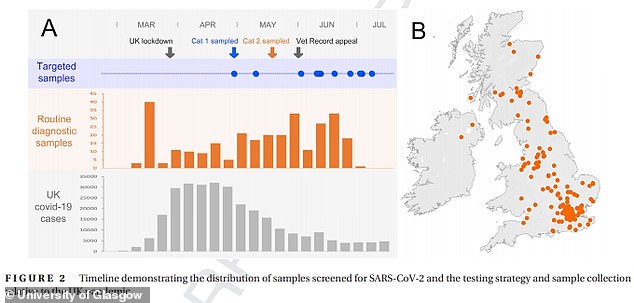Four-month-old kitten has to be put down after catching Covid from its owner: Study confirms two cases of human-to-cat transmission in Britain during 2020’s first wave
- The Ragdoll cat developed critical lung damage from a case of pneumonia
- University of Glasgow study said sick owners could pass virus onto their pets
- It is not clear, however, if the virus can transmit the other way from cat to person
- Research is needed because animals could trigger future outbreaks, expert said
- South Korea already has a Covid testing and quarantine system for cats and dogs
A kitten had to be put down after catching Covid from its owner during the UK’s first wave, scientists have revealed.
The cat was a four-month-old Ragdoll that got taken to the vet in April 2020 because it was struggling to breathe.
Its condition got worse in the following days and the kitten had to be put down, with post-mortem tests revealing it had lung damage from viral pneumonia and signs of infection with coronavirus, which causes the condition.
The owner suffered from Covid symptoms the month before but couldn’t get tested, and scientists concluded they had passed the virus to their pet.
A second case, both of them reported by experts at the University of Glasgow, saw a six-year-old Siamese cat also contract the illness from its owner in May but then go on to recover.
The scientists said there is no evidence that pets can spread the virus to humans but the connection needs investigating so it doesn’t trigger future outbreaks.
In South Korea officials have even developed a testing and quarantine system for pets that develop symptoms of the virus.
Animals are known to be susceptible to the virus – it is believed to have emerged in bats and other small mammals, and caused outbreaks on Danish mink farms – but it’s unclear how sick it makes them.


The cat that died was a Ragdoll kitten (left) that developed pneumonia after its owner had Covid, and the Glasgow researchers also reported that a Siamese cat (right) developed mild Covid but recovered (both are stock images, not the cats that got infected)

University of Glasgow researchers tested swab samples from nearly 400 sick cats across the UK (shown map right) but only two were positive for coronavirus, in April and May 2020. One of the cats even lived in a household with another cat that tested negative, suggesting the cases are rare
‘These two cases of human-to-animal transmission, found in the feline population in the UK, demonstrate why it is important that we improve our understanding of animal SARS-CoV-2 infection,’ said Glasgow’s Professor Margaret Hosie.
Professor Hosie led the study and said cases of the coronavirus have been found in various types of cat as well as dogs, hamsters and ferrets.
Her research found Covid cases in cats had been found in at least 15 countries during the pandemic, including the UK, US, France, Spain and Germany.
Both the animals in her study had symptoms of the infection – the Ragdoll developed pneumonia and struggled to breathe, while the Siamese cat had a runny nose and conjunctivitis in its eyes. Both their owners had Covid symptoms, too.
They were found in a batch of 387 tests done on cats that had similar symptoms, of which 19 were estimated to have come from homes where people had Covid.
The two were the only positive results, suggesting the cases are rare, and the Siamese cat even lived in the same house as another cat that tested negative.
The Siamese cat is believed to have been the one announced by the UK Government in July last year as the first case of an infected pet – that test was processed at a lab in Weybridge, Surrey. The location of the Ragdoll is unknown.
England’s chief veterinary officer, Christine Middlemiss, said at the time: ‘This is a very rare event with infected animals detected to date only showing mild clinical signs and recovering within in a few days.’
Professor Hosie said it was vital to know whether creatures could spread the virus back to people.
It’s possible they act as a ‘reservoir’ for the virus without being noticeably sick, meaning they carry it around, but not clear if it can be transmitted to people.
Her concern was that, if pet-to-owner transmission is possible, it could be a source of future outbreaks.
‘Currently, animal-to-human transmission represents a relatively low risk to public health in areas where human-to-human transmission remains high,’ Professor Hosie said.
‘However, as human cases decrease, the prospect of transmission among animals becomes increasingly important as a potential source of SARS-CoV-2 reintroduction to humans.
‘It is therefore important to improve our understanding of whether exposed animals could play any role in transmission.’
Governments have generally not done much to investigate or prevent Covid transmission among animals because human-to-human transmissions is such a big problem.
The biggest incident was when Denmark culled around 17million mink on its fur farms because a new variant of the virus emerged in the animals. There were suspected cases of it spreading to farmers but these were unconfirmed.
South Korea has taken action to prevent the virus spreading between pets and their owners, and has a quarantine system set up for animals that test positive.
The Ministry of Agriculture, Food and Rural Affairs said in February it had developed a testing and quarantine protocol for pets suspected of carrying the virus.
Its announcement came after a cat living in a missionary centre in Jinju, South Gyeongsang Province, tested positive for coronavirus on January 24.
Just like humans, cats and dogs will be required to quarantine for 14 days if they are positive for Covid, but a health ministry official said at the time: ‘There have been no confirmed cases of coronavirus infections spreading from pets to humans.’
